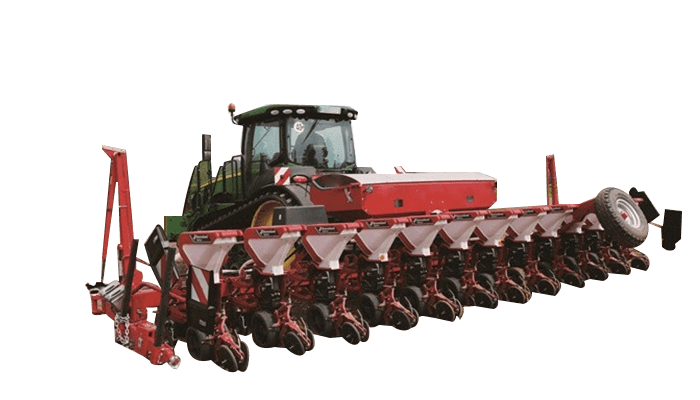In the vast fields, seeds are like dreams, waiting to be sown and sprouted. In this rapidly advancing agricultural era, seeder is not just tools for planting; it is also reliable assistants for every farmer. They blend technology with artistry, making each sowing process precise and efficient. These seeders seamlessly combine technology and artistry, controlling the depth and spacing of seeds to ensure that each seed receives optimal growing conditions. With modern technology, seeders integrate traditional farming methods and innovative techniques, making every sowing process both precise and efficient, bringing greater hopes for a bountiful harvest to farmers.
Seeders are mechanical devices used in agriculture to precisely sow seeds into the soil. They can distribute seeds evenly according to set depth and spacing, ensuring that each seed has good growing conditions.
In this article, we will delve into the types of seeders, their working principles, usage tips, and their important roles in modern agriculture.

Contents
- 1 I. The Secrets of Seeders: The Bridge from Seeds to Harvest
- 2 II. Types of Seeders: Choosing the One That Suits You Best
- 3 III. Factors to Consider When Choosing a Seeder
- 4 IV. Tips for Using Seeders
- 5 V. The Importance of Seeders in Modern Agriculture
- 6 VI. The Role of Seeders in Modern Agriculture
- 7 VII. Future Sowing Technology: Intelligence and Automation
- 8 Conclusion: A New Chapter Toward Efficient Agriculture
- 9 About Us: Minnuo Group
I. The Secrets of Seeders: The Bridge from Seeds to Harvest
Seeders are not just simple devices; they serve as the crucial bridge connecting seeds to harvest. With precise sowing technology, seeders ensure that every seed has optimal growing conditions.
- Precise Placement: Seeders use advanced mechanical or pneumatic methods to accurately place seeds in the soil, avoiding overlap and waste. For instance, pneumatic seeders utilize airflow to deliver seeds into the soil, which not only boosts efficiency but also guarantees even distribution.
- Depth Control: Modern seeders come with adjustable sowing depths, allowing different crops to thrive in ideal conditions. For example, corn seeds typically require deeper planting, while some root vegetables do well with shallower sowing.
- Soil Adaptability: Whether dealing with sandy, loamy, or clay soils, seeders can operate effectively across different soil types. With optimized designs, seeders adapt to various crop needs, ensuring the best sowing results.
II. Types of Seeders: Choosing the One That Suits You Best
In the market, there are various types of seeders, each with unique features that cater to different scales and types of agriculture:
Manual Seeders: Simple and Flexible
- Features: This type of seeder is usually made of plastic or metal, making it lightweight and easy to operate. It is suitable for small-scale home gardening.
- Advantages: Users can easily adjust sowing depth and spacing according to their needs. This seeder works well with various types of seeds, especially for crops that require precise planting, such as carrots and lettuce.
- Applicable Scenarios: Manual seeders are ideal for home gardens or small farms, especially for those who wish to grow fresh vegetables in their own yards.
Mechanical Seeders: Efficient Partners
- Features: This type of seeder is suitable for large-scale farming and is typically engine-driven. It can complete sowing tasks quickly and evenly.
- Advantages: Mechanical seeders save a significant amount of time and labor, especially in situations that require large-scale sowing. They can accomplish a large volume of work in a short period.
- Applicable Scenarios: Mechanical seeders are ideal for large commercial agriculture, particularly for planting field crops such as wheat and corn
Combined Seeders: Multi-Functional Machines
- Features: This equipment combines sowing and fertilization functions, allowing multiple steps to be completed in one operation.
- Advantages: Combined seeders enhance work efficiency, reduce the need for multiple machines, and increase operational convenience.
- Applicable Scenarios: For farms aiming for high efficiency, combined seeders are an ideal choice. They can quickly accomplish both sowing and fertilization tasks, especially in large fields.
III. Factors to Consider When Choosing a Seeder
When selecting a seeder, there are several key factors to consider:
- Crop Type: Different crops have varying requirements for seeders, so it is important to choose a seeder that suits specific crops.
- Land Size: For small farms, manual seeders or small mechanical seeders may be more appropriate. In contrast, for large-scale agriculture, mechanical or combined seeders offer greater efficiency.
- Budget: Seeders come in a wide price range, from a few hundred to several thousand dollars. A reasonable budget allocation can help you find a seeder that offers good value for money.
- Maintenance and Care: Choosing a seeder that is easy to maintain and has readily available parts can reduce problems during use.
IV. Tips for Using Seeders
To maximize the effectiveness of seeders, here are some useful tips:
- Regularly Check the Equipment: Before use, inspect all parts of the seeder to ensure there is no wear or damage. Timely repairs can prevent failures during the sowing process.
- Adjust Sowing Depth: Adjust the sowing depth according to the specific needs of different crops. Ensure that seeds are buried at an appropriate depth to promote healthy growth.
- Monitor Soil Moisture: Pay attention to soil moisture when sowing, as both overly dry and overly wet soil can affect seed germination rates. The ideal soil condition is moist but not muddy.
- Choose Quality Seeds: Using high-quality seeds can ensure better growth outcomes. Select certified seed suppliers to avoid using inferior seeds.
V. The Importance of Seeders in Modern Agriculture
In modern agriculture, the role of seeders has become increasingly prominent:
- Enhancing Production Efficiency: The use of seeders significantly boosts sowing efficiency, allowing farmers to accomplish more work in less time.
- Ensuring Food Safety: Through precise sowing, farmers can reduce the use of pesticides and fertilizers, thereby enhancing food safety and protecting the environment.
- Addressing Climate Change: The design of modern seeders also takes climate change into account, helping farmers tackle planting challenges under various weather conditions.
VI. The Role of Seeders in Modern Agriculture
In modern agriculture, the use of seeders has become a growing trend, especially in the pursuit of high yields and sustainable development. By effectively utilizing seeders, farmers can not only save time and labor but also improve the yield and quality of their crops.
- Boosting Efficiency: Seeders make large-scale planting feasible, significantly reducing the time and manpower required compared to traditional hand-sowing methods.
- Ensuring Crop Growth: Through precise sowing, seeders ensure that seeds are placed at the optimal depth and spacing, which helps improve germination rates and ultimately leads to a bountiful harvest.
- Advancing Agricultural Technology: As agricultural technology progresses, seeders continue to innovate, with more and more intelligent sowing solutions emerging.
VII. Future Sowing Technology: Intelligence and Automation
As technology advances, seeders continue to evolve. Future sowing technology will likely become even more intelligent and automated:
- Intelligent Seeders: Using sensors and data analysis, intelligent seeders can monitor soil conditions and climate changes in real-time, adjusting sowing strategies automatically to increase both efficiency and precision.
- Drone Sowing: With the development of drone technology, aerial sowing is becoming possible. Drones can quickly and accurately complete sowing tasks, especially in areas that are difficult to access.
Conclusion: A New Chapter Toward Efficient Agriculture
The emergence of seeders is undeniably a significant step in agricultural modernization. They not only boost production efficiency but also offer farmers a more convenient planting experience. Whether you have a small home garden or a large commercial farm, choosing the right seeder can greatly enhance your agricultural endeavors.
About Us: Minnuo Group
As you explore the fascinating world of seeders, consider Minnuo Group as your partner. As a leader in agricultural machinery, Minnuo Group is dedicated to providing high-quality, efficient sowing solutions for farmers. We offer a wide range of seeders, from manual to automated, to meet the needs of different scales and agricultural operations. Our team is committed to innovation and service, helping you achieve sustainable agricultural development. Whatever your requirements, Minnuo Group is a trusted partner. Let’s sow the seeds of the future together and harvest hope!

